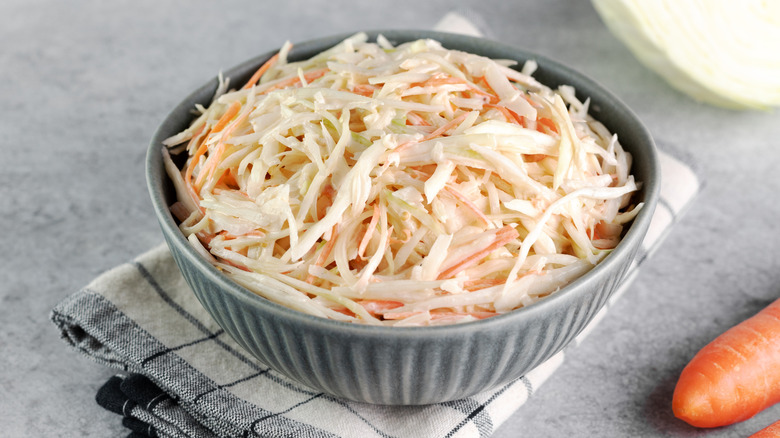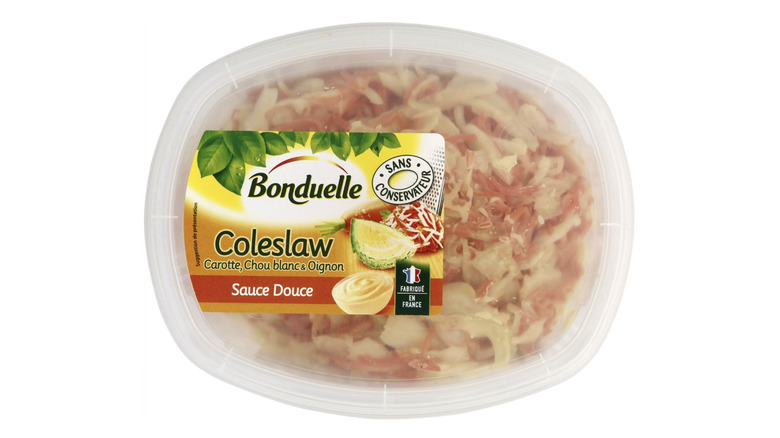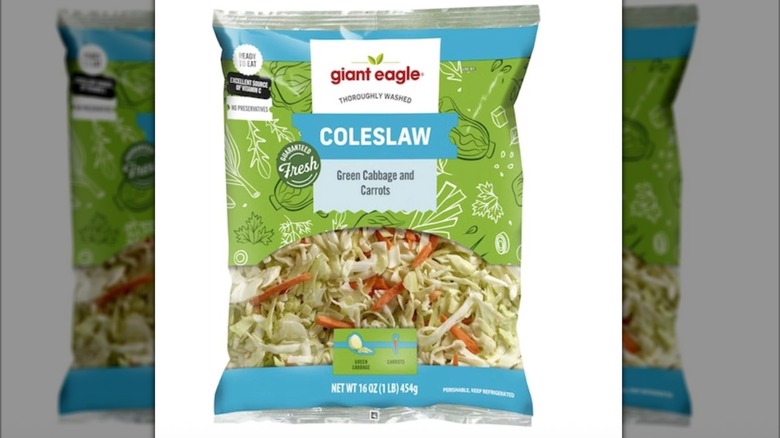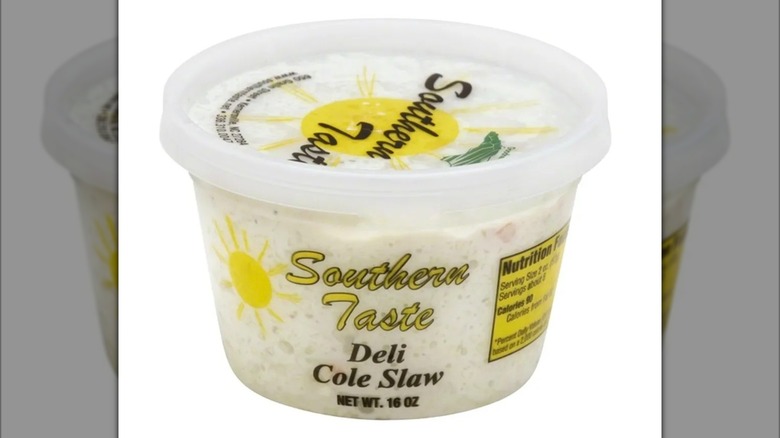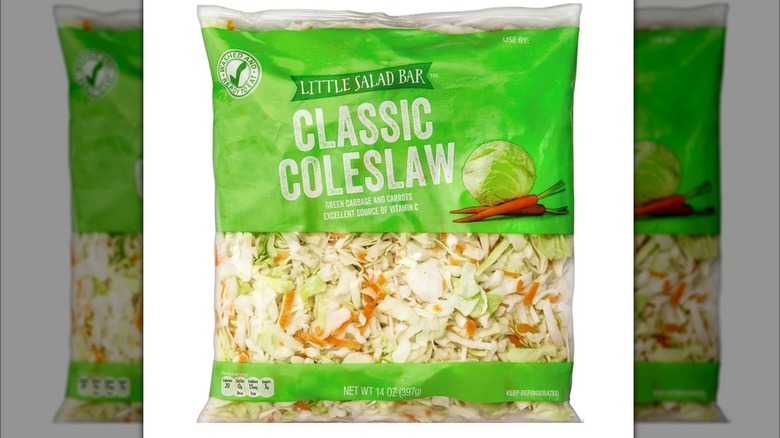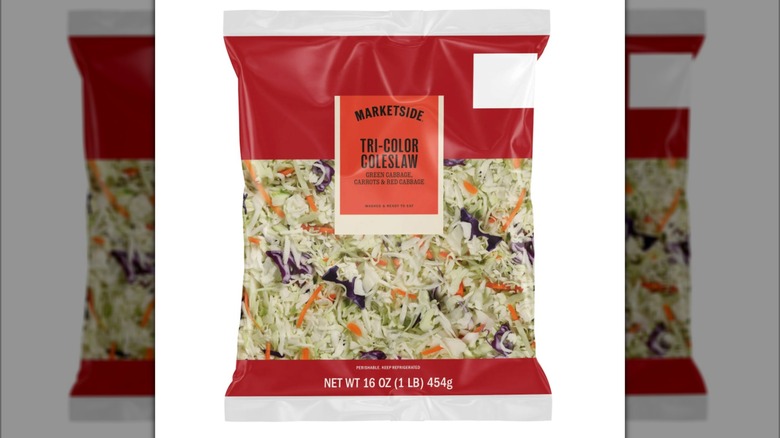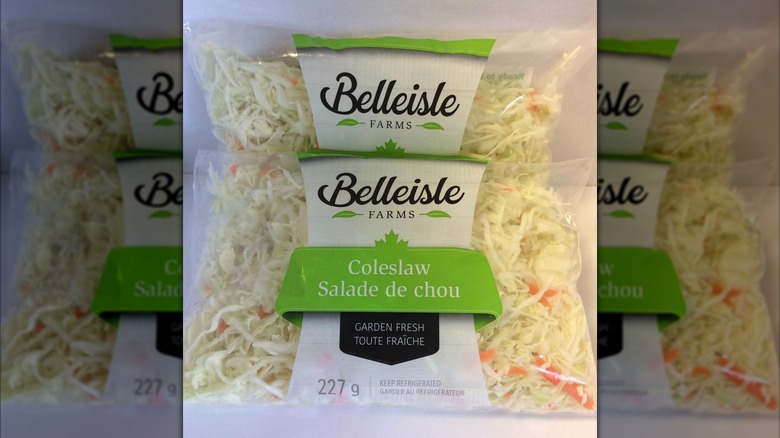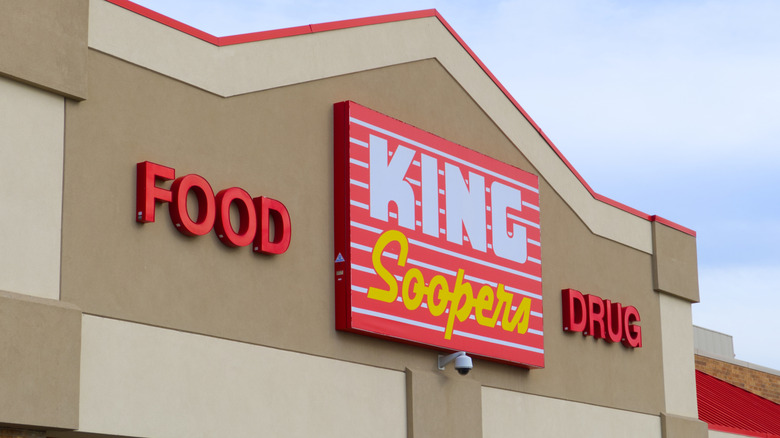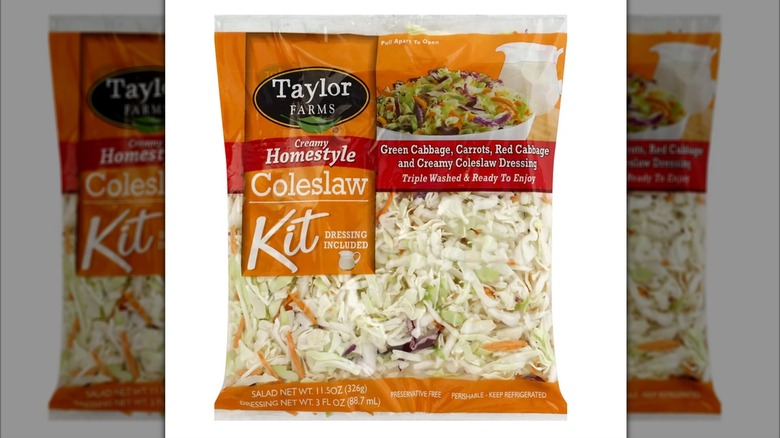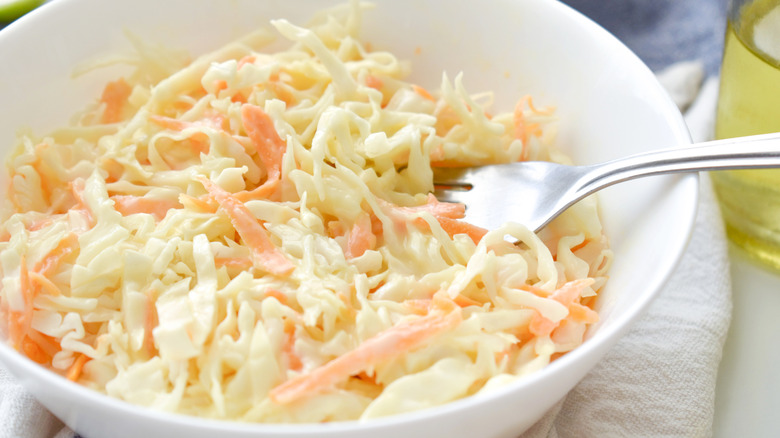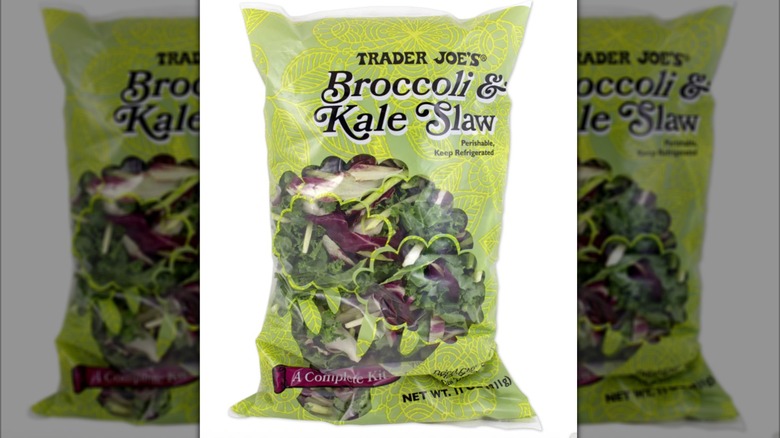Coleslaw Recalls That Rocked Grocery Store Shelves
We may receive a commission on purchases made from links.
As simple to prepare as it is delicious, classic coleslaw contains a vibrant medley of freshly diced green cabbage, red cabbage, carrots, and sometimes onion for an added kick. The tangy coleslaw dressing is typically made with rich mayonnaise, apple cider vinegar, and sugar — although the salad can also come with a vinegar-based dressing. One of the main appeals of this versatile side dish is its satisfying crunch, a perfect contrast to its creamy, mildly sweet dressing. In addition, coleslaw also makes a refreshing accompaniment to hearty dishes like crispy fried chicken or barbecued meat with a glass of white wine.
There is a lot that can go wrong with a coleslaw, however, especially in a commercial setting where the salad is prepared with ingredients sourced from various suppliers. After all, the more the ingredients are handled and processed, the higher the likelihood of contamination or mistakes. Curious to find out more about the biggest coleslaw recalls in U.S. history? Keep reading! And check out our article on produce recalls that affected millions, where we look at other headline-grabbing recalls of fruit and veg.
Bonduelle recalls coleslaw over listeria monocytogenes contamination fears (2025)
While Bonduelle's 2025 recall didn't affect the U.S., the company has been selling vegetables, salads, and other products in North America since it acquired Ready Pac Foods in 2017. Dating back to 1853 France, when it was established as a grain and juniper berry distillery, the Bonduelle brand has been family-operated for seven generations, steadily diversifying its operations.
In May 2025, Bonduelle pulled its Coleslaw Sauce Douce from supermarket shelves due to possible listeria contamination. The product was sold at Auchan, Carrefour, Galec, Cora, and Monoprix stores in Luxembourg, Belgium, France, and potentially additional markets across Europe. The company announced the recall after a routine inspection revealed the presence of the harmful pathogen.
Listeria can manifest itself in a range of unpleasant symptoms, including fever, nausea, diarrhea, muscle aches, and fever. The bacteria can be particularly dangerous for the elderly, young children, individuals with weakened immune systems, and pregnant women. In serious cases, the foodborne infection can require medical attention and even lead to death.
Fresh Express recalls salad products including coleslaw due to possible contamination with listeria (2021)
The Fresh Express recall of 2021 was linked to 10 hospitalizations and one death. More specifically, the listeria outbreak was traced back to the company's Streamwood, Illinois, plant after the Michigan Department of Agriculture and Rural Development found traces of the pathogen in Fresh Express Sweet Hearts salad during routine testing.
The discovery led to the recall of around 200 different products under brands including Fresh Express, Giant Eagle, Little Salad Bar, Marketside, O Organics, Signature Farms, Simply Natural Organic, and Wellsley Farms Organic. The products were distributed across 19 states, with some items also shipped to Canada.
The recall affected four coleslaw products, including 16-ounce tubs of Giant Eagle Coleslaw, 14-ounce tubs of Little Salad Bar Classic Coleslaw, 10-ounce tubs of Marketside Angel Hair Coleslaw, and 14-ounce tubs of Signature Farms Coleslaw 3 Color. In an effort to contain the listeria outbreak, Fresh Express temporarily stopped production at its Streamwood facility.
Southern Taste of Kernersville recalls coleslaw after it tests positive for listeria monocytogenes (2020)
Southern Taste of Kernersville calls its coleslaw products "cole slaw," an alternative name for the salad (yes, coleslaw is actually a salad). Coleslaw was brought to the U.S. — or more specifically, New York — by Dutch settlers in the early 17th century. Not many of us realize that the word coleslaw actually draws its origins from Dutch, where it's called "koolsla" (kool meaning cabbage, and sla meaning salad).
In 2020, Southern Taste of Kernersville came under scrutiny for all the wrong reasons when it pulled its Southern Taste Deli Cole Slaw off supermarket shelves due to a possible contamination with listeria monocytogenes. The 16-ounce containers of the slaw were distributed in grocery stores across North Carolina. The recall was issued after a standard inspection by the N.C. Department of Agriculture and Consumer Services' Food and Drug Protection Division revealed the presence of the pathogen.
Fresh Express recalls products containing iceberg lettuce, red cabbage, and carrots due to potential cyclospora contamination (2020)
While the 2020 Fresh Express product recall claimed no lives, it was linked to more than 700 illnesses and nearly 40 hospitalizations. The nationwide safety alert involved products containing iceberg lettuce, red cabbage, and carrots sold under various brand names, including Jewel-Osco Signature Farms, Aldi Little Salad Bar, Hy-Vee, ShopRite Wholesome Pantry, Walmart Marketside, and Giant Eagle. The recall involved bagged coleslaw products including Giant Eagle Life's Getting Fresher Coleslaw, Little Salad Bar Classic Coleslaw, and Signature Farms Coleslaw 3 Color.
All of the pulled products were made at Fresh Express' plant in Streamwood, Illinois. Unfortunately, the investigation into the safety scare didn't determine the exact origin of the cyclospora contamination. The only lead was an FDA inspection that found cyclospora in a Florida water canal that had been used for irrigation purposes in the area where the vegetables were grown.
The FDA gave the Fresh Express recall a Class II designation, indicating a "situation in which use of, or exposure to, a violative product may cause temporary or medically reversible adverse health consequences or where the probability of serious adverse health consequences is remote." Cyclosporiasis is an intestinal infection, which typically manifests itself in diarrhea and other gastrointestinal issues.
Dole Fresh Vegetables recalls coleslaw over fears of salmonella contamination (2019)
Right toward the end of 2019, Dole Fresh Vegetables issued a precautionary recall of its Marketside Tri-Color Coleslaw and President's Choice Colorful Coleslaw due to salmonella concerns. The possible contamination was discovered after the Canadian Food Inspection Agency found salmonella bacteria during random testing of President's Choice Colorful Coleslaw. The products had been sold in Alaska, California, Idaho, Montana, Nevada, Oregon, and Washington, as well as in Alberta, British Columbia, and Saskatchewan in Canada. In total, more than 10,000 pounds of the coleslaw products were pulled off supermarket shelves.
The Class II product withdrawal was initiated as a precautionary measure following routine testing. While no health issues were linked to the products at the time, salmonella is no laughing matter. The infection can result in diarrhea, nausea, vomiting, fever, and abdominal pain in otherwise healthy adults. However, the symptoms can be much more severe when it comes to consumers with weakened immune systems, the elderly, and children.
This wasn't the first time Dole Fresh Vegetables recalled a coleslaw product. In 1992, the company pulled Dole Brand Coleslaw Mix from supermarket shelves in Canada due to possible contamination with listeria. The recall was issued after the pathogen was discovered in three different samples of the product.
Belleisle Farms recalls coleslaw due to possible listeria monocytogenes contamination (2018)
Belleisle Farms has been dedicated to growing fruit and vegetables for three generations. Located in Belleisle Creek, New Brunswick, the 270-acre farm supplies the produce to grocery stores across Atlantic Canada. In 2018, Belleisle Farms was involved in a food safety incident when the company recalled its 227-gram packages of coleslaw due to concerns over listeria contamination. The tainted coleslaw was distributed in Newfoundland, Labrador, Nova Scotia, New Brunswick, and Prince Edward Island.
While no adverse health effects had been connected to the product at the time, listeria takes up to 70 days to incubate in the human body. According to the Canadian Food Inspection Agency, "Food contaminated with Listeria monocytogenes may not look or smell spoiled but can still make you sick. Symptoms can include vomiting, nausea, persistent fever, muscle aches, severe headache, and neck stiffness" (via Food Safety News).
King Soopers and City Market recalls coleslaw over fears of possible contamination with listeria monocytogenes (2017)
The King Soopers 2017 listeria product alert involved items sold from the refrigerated deli display cases at King Soopers and City Market outlets in Wyoming, Colorado, Utah, and New Mexico. The specific products that were pulled off the shelves included Deli Colorado Coleslaw, as well as Deli Broccoli Almond Salad, Asian Pasta Salad, and Deli California Broccoli Salad. The alert was sparked after King Soopers received information from one of its suppliers, Mann Packing, that one of the ingredients in the products may have been contaminated with listeria.
Only a month earlier, King Soopers recalled its 6.8-ounce, pre-packaged deli chicken salad sandwiches for the same reason — a potential listeria contamination. The offending handheld, which was distributed in King Soopers and City Market stores, took place after King Soopers was notified by the manufacturer, Journey Cuisine, that it may be tainted by listeria.
Taylor Farms Retail recalls Taylor Farms Creamy Homestyle Coleslaw Kits due to undeclared allergen (2017)
Taylor Farms Creamy Homestyle Coleslaw Kits consist of a mix of triple-washed shredded green and red cabbage (two of the best types of cabbage for coleslaw) and carrots, as well as a creamy coleslaw dressing. In 2017, Taylor Farms Retail removed the bagged product from circulation after it was discovered that the dressing contained milk, an allergen that wasn't declared on the packaging. Milk is one of the nine major allergens recognized by the FDA, alongside eggs, fish, shellfish, tree nuts like walnuts and almonds, peanuts, wheat, soybeans, and sesame.
The allergen was identified during a routine quality check. At the time, no consumers reported suffering any adverse health effects after eating the coleslaw. While symptoms of allergic reactions can vary, they can include hives, swelling, rash, vomiting, diarrhea, abdominal cramps, and coughing or wheezing. At their most severe, allergic reactions can lead to anaphylactic shock, constricted airways, and suffocation.
CC Kitchens recalls salad and slaw kits due to potential listeria contamination (2017)
The food processing chain of CC Kitchens reads a little like a corporate family tree. The Castellini Group is the parent company of Club Chef, which, in turn, owns CC Kitchens, which is responsible for fresh-cut salad-processing. However, the story doesn't stop there because CC Kitchens sources its produce for suppliers, which is precisely what led to this public health scare.
A bad dressing isn't the only way to ruin coleslaw, as exemplified by the 2017 recall, which was set in motion after a lettuce supplier alerted CC Kitchens that its facilities tested positive for listeria. The offending greens made an appearance in a number of the company's products, including Fiesta Slaw and Trail Slaw Kit, which had been distributed in Kroger retail stores in Ohio, Michigan, and West Virginia. In total, CC Kitchens recalled more than 2,000 pounds worth of product. Luckily, no adverse health effects were reported in connection with the contaminated coleslaw at the time.
Ghiringhelli Specialty Foods Firm recalls Trader Joe's Broccoli Slaw & Kale Salad due to possible listeria monocytogenes contamination (2016)
Coleslaw has evolved over the years, with many companies adding their own unique twist to the cabbage salad and using surprising coleslaw ingredients to enhance it. Some companies have even taken this a step further by substituting the cabbage in the slaw with completely different ingredients. This is precisely what Ghiringhelli Specialty Foods Firm did with its Trader Joe's Broccoli Slaw & Kale Salad. Instead of the classic coleslaw ingredients, the slaw is made with broccoli, kale, white chicken meat, sunflower seeds, and cranberries. A sweet and spicy vinaigrette replaces the traditional creamy coleslaw dressing.
In 2016, Ghiringhelli Specialty Foods Firm announced a recall of more than 33,000 pounds of its Broccoli Slaw & Kale Salad over concerns that the product was tainted with listeria. The slaw was sold at Trader Joe's stores in Arizona, California, Nevada, and Utah. The recall was issued after a supplier, SunOpta, notified Ghiringhelli that the sunflower seeds in the bagged product may be contaminated with the harmful bacteria. At the time, no consumers reported getting sick after eating the product.
The FDA gave the Trader Joe's Broccoli Slaw & Kale Salad recall a Class I designation, indicating just how seriously it was treating the listeria threat. This classification is defined as "a situation in which there is a reasonable probability that the use of, or exposure to, a violative product will cause serious adverse health consequences or death."
